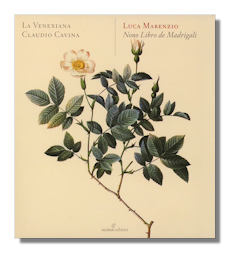
The Internet's Premier Classical Music Source
Related Links
- Marenzio Reviews
- Latest Reviews
- More Reviews
-
By Composer
-
Collections
DVD & Blu-ray
Books
Concert Reviews
Articles/Interviews
Software
Audio
Search Amazon
Recommended Links
Site News
 CD Review
CD Review
Luca Marenzio

Nono libro de Madrigali (1599)
- Cosi nel mio parlar voglio esser aspro
- Amor, i'ho molti et molti anni pianto
- Dura legge d'amor, ma benché obliqua
- Chiaro segno amor pose alle mie rime
- Se si alto pon gir mie stanche rime
- L'aura che'l verde lauro e l'aureo crine
- Il vago e bell'Armillo
- Solo e pensoso i più deserti campi
- Vivo in guerra mendico e son dolente
- Fiume ch'a l'onde tue ninfe e pastori
- Parto o non parto?
- Credete voi ch'i viva
- Crudele, acerba, inesorabil morte
- La bella man vi stringo
La Venexiana/Claudio Cavina
Glossa GCDC80906
The 14 madrigals comprising Luca Marenzio's (c.1553-1599) ninth book were the last to be published during the composer's lifetime. The circumstances of his early death are unclear. The same must be said for his possible religio-political intrigues into which he allowed himself to be plunged on his return from Poland in 1598. And also for the consequent ups and downs both of patronage itself and of the expectations of his patrons. Indeed, the six voices (including that of their director, Claudio Cavina) and three instrumentalists (two lutes, harpsichord) of La Venexiana perform these compelling and somewhat downbeat madrigals without attempting to provide spurious explanations or glosses on the possible state of mind of the composer at this point in his musical development.
There is no sense, for example, of La Venexiana's trying to sound valedictory or unduly regretful – because we can only speculate on the real reasons for any melancholy. Yet plangency and restraint are there aplenty. And a certain weariness. Few of these madrigals ever spring or jaunt in the ways others of the genre do. The dissonances (at the start of Solo e pensoso [tr.8], for instance) grab our attention; and La Venexiana sees the pieces through without either questioning them or overplaying them.
The ensemble, in fact, has captured well the sense of an ambitious and confident composer pursuing (by writing for five voices) more ambitious aims, determined (it almost seems) to work regardless of the perhaps obviously limited life left in the genre and the likely support of the d'Este family, his patrons, whose own fortunes were declining visibly. The choice of poetry by Petrarch, whose popularity was then waning (in favor of Guarini and Tasso) was a bold and uncompromising one that bespeaks musical integrity. At the same time, other structural, metrical and even syllabic decisions which Marenzio made show him very much to be following his own bent.
Pain, love, loss and hope are the subjects of the poetry which Luca set in this Ninth Book. The occasional addition of the quiet lute(s) and harpsichord – together with the variety throughout the 14 items – slowly paints a picture of intensity which La Venexiana convey admirably. They do this almost in the way a truly attuned singer and accompanist can do with a song cycle. Their tempi, sense of direction and gradual building and loosening of texture (in Credete voi [tr.12], for example) are superb. When this is followed by the searing Crudele, acerba, it's not labored nor is an attempt made so languidly to dwell on it as to draw attention to the emotion. Instead, it's the expression in words and music (in that order) of that emotion: La Venexiana have it just about right.
The recording was originally made in 1999 in the Church of the Blessed Virgin a Colletto, Roletto, a tiny village near Turin. The CD has been hard or impossible to get in recent years: its recent reissue is most welcome. The acoustic is close and intimate – well suited to the atmosphere of these intense madrigals. At their close, La Venexiana has made you feel as though Marenzio has led you through a journey that could never have been peaceful. Yet was neither resigned nor utterly hopeless. That suffering and somewhat reluctant acceptance played a part is indisputable.
There is a useful and thorough essay in the booklet that comes with the "digipak". The texts are in Italian only. This is the only complete collection of this ninth book and, given the significance – if not yet the accepted stature of Marenzio – must be considered a recording to buy and come to know without a second thought. Compelling music, compellingly played.
Copyright © 2010, Mark Sealey.




















